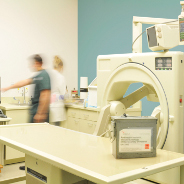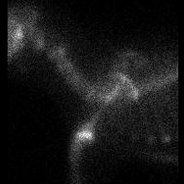Nuclear Medicine
Nuclear medicine (also known as nuclear scintigraphy) is a noninvasive imaging specialty where a small amount of radioactive isotopes (or tracers) are administered and then detected using a special gamma camera, in order to evaluate the function of bones, kidneys, thyroid, or liver tissue. Nuclear medicine does an exceptional job at assessing function with less importance on structure.
Nuclear Medicine is particularly effective in evaluating:
- Glomerular Filtration Rate (GFR) — kidney function
- Portosystemic shunts / vascular anomaly
- Bone evaluation for remodeling
- Lung perfusion
- Thyroid activity
- Radiolabeled tracer monitoring
- White blood cell labeling
- Antibiotic labeling
- Chemotherapeutic tracing
Nuclear medicine is also ideal for addressing physiologic questions such as “Where is a substance being collected or excreted from the body?” “At what rate is this occurring?” and “Is organ or blood flow being altered?”


